|
Progressive Men of Iowa
1899
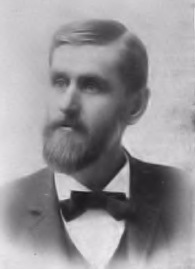 BRECKENRIDGE, Allender Insign,
well known in the business circles of Waterloo, is the
son of Josiah Carey Breckenridge, who was a shareholder,
director and superintendent of the Meriden Cutlery
works, of Meriden, Conn. That immense plant owed its
success to the wisdom and energy of Mr.
Breckenridge.
He was a man of
attractive manners, genial, generous and beloved by all
his employees Shortly after completing a handsome
residence in Meriden his life was suddenly cut short by
an affection of the heart. The maiden name of the
mother, who now resides with her youngest son in
Meriden, was Frances Augusta Bradley. She is a woman of
scholarly attainments and great literary ability, and
now, at the age of 70, frequently contributes articles
to journals and magazines. BRECKENRIDGE, Allender Insign,
well known in the business circles of Waterloo, is the
son of Josiah Carey Breckenridge, who was a shareholder,
director and superintendent of the Meriden Cutlery
works, of Meriden, Conn. That immense plant owed its
success to the wisdom and energy of Mr.
Breckenridge.
He was a man of
attractive manners, genial, generous and beloved by all
his employees Shortly after completing a handsome
residence in Meriden his life was suddenly cut short by
an affection of the heart. The maiden name of the
mother, who now resides with her youngest son in
Meriden, was Frances Augusta Bradley. She is a woman of
scholarly attainments and great literary ability, and
now, at the age of 70, frequently contributes articles
to journals and magazines.
A tradition concerning the derivation of the name
Breckenridge, from the Scotch bracken or common brake,
which grows abundantly on the ridge where the family was
first known, has been handed down from generation to
generation. The name has been changed, however, by the
substitution of the letter "e " for that of "a " in the
first syllable.
The earliest member of the family of whom we have
any knowledge is Jacobus Brackenridge, who came to this
country and settled on the Ellan tract, in the forks of
the Chicopee river, now Palmer, Mass. There he reared
a large family in comfort and respectability. He was a
good man, abhorring deceit, and through his teachings
and example his children grew up to be religious,
honorable men and women. The descendants
from this family are many, embracing six generations,
now scattered throughout the United States. They are
proud of the family name, and the love of kin is one of
their most marked characteristics. As a whole they are
independent, intelligent, moral and modest. No prominent
political positions have been held by them, but "They do
the greatest good who live hidden lives," and to that
class it appears to be their desire to belong. Someone
has said, "There is scarcely a college in the United
States that has not educated a Breckenridge, " a record
of which they are most proud.
A. I. Breckenridge was born at Meriden, Conn.,
August 12, 1845. He attended the public schools until 18
years of age, then spent two years in the Episcopal
academy, at Cheshire, Conn. This was followed by a
course in Trinity college, at Hartford, Conn., after
which the young man started out in the world for
himself, first taking a position in New York city, in
the store and sample rooms of the Meriden Cutlery
company; coming to Iowa in 1878 he located at Waterloo
and engaged in the coal business, in partnership with
George Bancroft.
Later he formed a co-partnership with A. J.
White, and opened an insurance office. In 1877 he
entered the employ of the Illinois Central as
timekeeper, but his health failed and he was compelled
to go south. After a time he returned to Waterloo and
re-engaged in the insurance business in partnership with
J. K. Sweeny. In 1894 Mr. Sweeny sold his interest to G.
C. Kennedy,
since which time the firm of Breckenridge & Kennedy
has enjoyed a constantly increasing business. In 1892
Mr. Breckenridge was elected secretary of the Perpetual
Building and Loan association, the duties of which he
has accurately and faithfully discharged, and to which
he now gives his entire time. He is a member of the
Columbia club, a social organization of considerable
note. Himself and his two oldest sons are members of
Ascalon Commandery No. 25, Knights Templar. They enjoy
the peculiar distinction of having taken the Royal Arch
Mason and Commandery degrees together, there being but
one other instance in the history of the United States
where father and two sons formed a team for chapter
degrees, and, so far as known, no other where they took
the Commandery degrees together.
His name is among the signers of the original
articles of incorporation of Christ Church parish. He
was elected secretary of the vestry soon after, which
office he still holds, and is lay reader in the church
and superintendent of the Sunday school. August 23, 1871,
he was married to Mary Wheelock, the adopted daughter of
Walter and Sarah Wheelock, of Brooklyn, N. Y. They have
seven children living, Allender Robert, Walter Wheelock,
Marietta Sarah, Frances Augusta, William Carey,
Frederick Keyes and Harriet Mildred, having lost one
daughter, Florence Evelyn, who died in
1887.
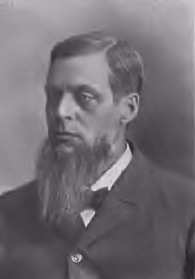 EDDY, Willard, M. D., is a descendant of the
family which came from England to this country more than
250 years ago.
Both his grandfather, Esek Eddy, and his
great-grandfather, Samuel Eddy, were soldiers in the
revolutionary war. His father, Erastus Eddy, was a
farmer and owned 150 acres of land near Buffalo, N. Y., upon which
he lived for over sixty years, and died at the age of 87
years. His
mother continued to own this farm until November 21,
1897, when she died at the age of 83 years. Her name was
Dorliska Middleditch, and she raised a family of ten
children, six boys and four girls. She was a sister
of Dr. A. Middleditch, who has lived in Waterloo ever
since 1856. EDDY, Willard, M. D., is a descendant of the
family which came from England to this country more than
250 years ago.
Both his grandfather, Esek Eddy, and his
great-grandfather, Samuel Eddy, were soldiers in the
revolutionary war. His father, Erastus Eddy, was a
farmer and owned 150 acres of land near Buffalo, N. Y., upon which
he lived for over sixty years, and died at the age of 87
years. His
mother continued to own this farm until November 21,
1897, when she died at the age of 83 years. Her name was
Dorliska Middleditch, and she raised a family of ten
children, six boys and four girls. She was a sister
of Dr. A. Middleditch, who has lived in Waterloo ever
since 1856.
Willard was born in Erie county, N. Y., July 30,
1838, and received a common school education. He then
went to the academy at Springville, N. Y. and from there
to Genesee seminary near Rochester, N. Y., for four
years. In 1860 he went to the University of Michigan and
commenced the study of medicine. In March, 1863, he
graduated from the medical department of that university
and was one of the five that stood highest. All his
expenses at seminary and medical college were paid by
himself, by his pre-emption of public land in Minnesota,
then selling it in 1863 he came to Iowa and located at
Monticello, Jones county, where he practiced medicine
for four years. He removed to Waterloo in 1867 and has
practiced there ever since that date. Dr. Eddy saved
money from the commencement of his practice, and
carefully invested his surplus earnings in real estate
and real estate loans. He has always been very careful
and conservative in business affairs, and has made an
eminent success both as a physician and a financier. His
income is now several thousand dollars per year above
his expenses, and his estate must be worth many thousand
dollars. He has never received any property by
inheritance. He acquired it all by his professional
labors and careful investments.
Dr. Eddy was married in June, 1864, to Miss P.
Gertrude Hammond, of Waterloo, Iowa. They had one child,
Walter F., who was drowned while skating, Thanksgiving
day, 1886, when only 13 years of age. The sudden and
tragic death of their only child was a terrible shock to
both the parents, and one from which Mrs. Eddy never
recovered. Her mind became partially unbalanced and she
finally went to travel in Europe, hoping to regain her
normal composure of mind. After waiting ten years the
doctor was again married June 29,1896, to Miss Sarah E.
Cadwallader, of Waverly, the daughter of Philip
Cadwallader. They have a son, born April 29, 1897, a
strong, healthy boy, Roger Willard
Eddy.
Dr. Eddy's first vote was cast for
Abraham Lincoln, and he has voted the republican ticket
ever since. He has been a member of the First
Congregational church of Waterloo for thirty years. For
many years he has belonged to the Black Hawk County
Medical society, Cedar Valley Medical society and the
Iowa State Medical society.
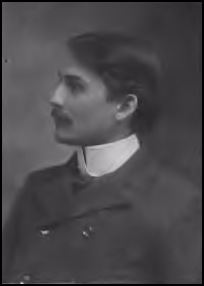 EDGERS, Eben Barton, was born on his
grandfather's farm near Brockville, Ontario, August 11,
1868, where his boyhood days were spent. He attended the
schools of that place and afterwards went to the
Newberry school. He took a course in the high school at
Smith's Falls and finally graduated in the dental
department of the University of Maryland, at Baltimore,
in the class of 1892. When a boy Mr. Edgers had a hard
struggle, having to earn his living and work his way
through college without aid. As he began to acquire some
knowledge of dentistry in the course of his studies, he
utilized it during vacations by practice. In this way he
earned the means to defray his college expenses when the
term began again, thus managing to finish the course and
acquire a thorough knowledge of the profession he was to
follow. EDGERS, Eben Barton, was born on his
grandfather's farm near Brockville, Ontario, August 11,
1868, where his boyhood days were spent. He attended the
schools of that place and afterwards went to the
Newberry school. He took a course in the high school at
Smith's Falls and finally graduated in the dental
department of the University of Maryland, at Baltimore,
in the class of 1892. When a boy Mr. Edgers had a hard
struggle, having to earn his living and work his way
through college without aid. As he began to acquire some
knowledge of dentistry in the course of his studies, he
utilized it during vacations by practice. In this way he
earned the means to defray his college expenses when the
term began again, thus managing to finish the course and
acquire a thorough knowledge of the profession he was to
follow.
Soon after graduating he opened his first office
at Lyndonville, in Vermont, where he had previously
studied in a dental office. He next moved to
Tecumseh, Mich., and engaged in the practice of his
profession.
He came to Iowa in April, 1893, and located at
Waterloo. He associated himself with Dr. A. N. Ferris in
the practice of dentistry, the partnership continuing
until February, 1895, when Dr. Edgers opened an office
for himself on the east side of the river. He is a
member of the State society, the Northern Iowa Dental
society, and the Black Hawk Dental society.
Dr. Edgers has literary tastes, and is one of the
active members of the Fortnightly club of Waterloo,
which is the leading literary club of that city. He is
past chancellor of Helmet Lodge No. 89 of the Knights of
Pythias of Waterloo. He is a member of the
Congregational church and in politics votes the
republican ticket.
He was married June 16, 1895, to Miss Cora Belle
Newton, daughter of George and Jane
Newton.
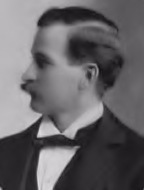 FULLERTON, Kern M., D. D. S., of
Cedar Falls. This bright and successful young
professional man was born in Crawford county, Pa.,
February 9, 1865. His great-grandfather on the paternal
side emigrated from the north of Ireland to the United
States. The family originated in Scotland, but the exact
date of the removal of the first members to Ireland is
not known. In the spelling of the name the letter "e"
has been substituted for that of "a," as it appeared in
the second syllable of the signatures of the early
Fullartons.
At the time of their
residence in Ireland they were termed Protestant
Catholics, that being the name given to those settlers
who came from Scotland and located in the north of
Ireland. Grandfather Fullerton was a very rich man, as
riches went in those days, and his wealth was
represented in most part by broad, fertile acres and
chests of gold and silver. The maternal grandparents
were natives of Germany, but a branch of the family
came, at a very early period, from Greece. FULLERTON, Kern M., D. D. S., of
Cedar Falls. This bright and successful young
professional man was born in Crawford county, Pa.,
February 9, 1865. His great-grandfather on the paternal
side emigrated from the north of Ireland to the United
States. The family originated in Scotland, but the exact
date of the removal of the first members to Ireland is
not known. In the spelling of the name the letter "e"
has been substituted for that of "a," as it appeared in
the second syllable of the signatures of the early
Fullartons.
At the time of their
residence in Ireland they were termed Protestant
Catholics, that being the name given to those settlers
who came from Scotland and located in the north of
Ireland. Grandfather Fullerton was a very rich man, as
riches went in those days, and his wealth was
represented in most part by broad, fertile acres and
chests of gold and silver. The maternal grandparents
were natives of Germany, but a branch of the family
came, at a very early period, from Greece.
The early life of this Mr. Fullerton was spent at
the place of his birth near Meadville, Pa., where he
attended the district school. Later he entered the high
school at Cambridge. Upon leaving the home farm
permanently he removed to Ohio and engaged with a
railroad contractor, remaining there for several months;
then he returned to Pennsylvania and was employed in the
lumbering districts of Elk county. In 1887 he came to
Iowa, and soon thereafter entered the dental department
of the Iowa State university, from which he graduated in
1889. During his college life he was a tireless student,
and the hours that were spent in a chase after pleasure
by many of his associates were by him devoted to hard
and persistent study. He was foremost
among those who organized the S. U. I. Dental society.
This organization was composed of the students of that
department, and held weekly meetings where papers on
dentistry, prepared by the students, were read and
discussed.
In politics Dr. Fullerton is a democrat, but is
not a radical politician. He is a member of the Knights
of Pythias and B. P. O. E. In a professional way
he belongs to that class to which work for the elevation
of his science is a positive pleasure. He is a member of
the Eastern Iowa Dental society and the Iowa State
Dental society, having served as president of the first
named organization. He was elected president of the Iowa
State Dental society at its annual meeting held in Des
Moines in May, 1897, serving one year. Being keenly
alive to the importance of being up to date in his
profession, Doctor Fullerton takes a deep interest in
all matters that will in any way assist him to that end.
His library is well stocked with dental literature, and
he keeps up with the spirit of progression in his
profession.
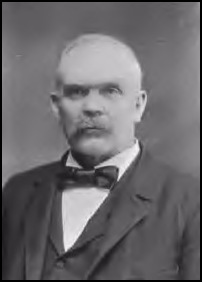 HOLMES, Richard, president of the Waterloo
State bank, and a resident of Black Hawk county for
thirty-six years, is a native of England. He was born
near Manchester, under the sovereignty of Queen
Victoria, April 20, 1842. His father, James Holmes, was
a farmer in good circumstances, and a man of sterling,
upright character. His mother, Ann Emerson (Holmes), was
a noble woman, whose Christian qualities and tender
spirit ever exerted the best of influence over her
family of eight children, to whom she was always the
devoted mother, instilling into their thoughts and
actions, as they grew up around her, all that was good,
pure and ennobling. HOLMES, Richard, president of the Waterloo
State bank, and a resident of Black Hawk county for
thirty-six years, is a native of England. He was born
near Manchester, under the sovereignty of Queen
Victoria, April 20, 1842. His father, James Holmes, was
a farmer in good circumstances, and a man of sterling,
upright character. His mother, Ann Emerson (Holmes), was
a noble woman, whose Christian qualities and tender
spirit ever exerted the best of influence over her
family of eight children, to whom she was always the
devoted mother, instilling into their thoughts and
actions, as they grew up around her, all that was good,
pure and ennobling.
Richard was the eldest of the children, and from
early boyhood was a great aid to his father in helping
to care and provide for the family. He thus early
learned the principles of industry and economy, which
applied to all his undertakings, though active manhood
has enabled him to now enjoy the fruits of his labors in
comfort.
The family came from England in 1854 and landed
first at Montreal, after a voyage of eight weeks spent
on the Atlantic ocean in a sailing vessel. Three months
after arriving at Montreal, they came west and settled
in Greene county, Wis. Here Richard assisted his father
in erecting a log cabin, and, during the next nine
years, was actively engaged in clearing the farm and
making a home in the wilds of that state.
His education consisted in what he obtained while
attending the common schools during the winter months.
When Richard was 21 the family decided to come farther
west. In company with his father, they walked fifty
miles to a railroad, and came to Waterloo, Iowa, where,
believing they would have a better opportunity to judge
of the quality of the land, and most desirable location
for a home, they started out on foot, and, after a few
days' time spent in the search, they located in Lincoln
township. Richard's father returned to the family in
Wisconsin to remain during the winter and prepare for
the journey west in the spring, while he himself
obtained employment in a stone quarry, near their new
home, and remained there until spring.
He then returned to Wisconsin and assisted in
moving the family to Black Hawk county, and soon
afterwards bought land in Eagle township, where he
farmed for a number of years. During the fall and winter
of each year he operated a threshing machine, and was
very successful financially. Mr. Holmes spent the
winters of 1872-73-74 in England. In 1882 he moved to
the town of Waterloo and there engaged in the implement
business with James R. Vaughn in 1885, under the firm
name of Holmes & Vaughn. This partnership continued
for five years, during which time they built up an
extensive trade throughout the state. In 1890 he retired
from active business life, and was made president of the
Waterloo Gasoline Engine company. He is also president
of one of the strongest financial institutions in the
state - the Waterloo State bank, which was organized in
1893.
Politically Mr. Holmes is a republican, and an
advocate of sound money. He is a member of the Baptist
church, and was at an early age religiously instructed,
so that now one of his greatest sources of strength is
his faith in a Savior, through whom is gained all
happiness and strength. Mr. Holmes was
married September 21, 1876, to Miss Mary Vaughn,
daughter of James Vaughn, a well-to-do farmer of Black
Hawk county.
We have, in Mr. Holmes, an example of the sturdy
business man and upright citizen, whose honesty of
purpose, industry, economy and straightforwardness in
his dealings with his fellowmen has won for him the
honorable though unostentatious position he holds in
life. It is such citizens as Mr. Holmes who have made
Iowa what it is today.
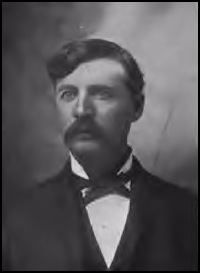 HUKILL, Anson Theodore, the efficient
superintendent of the schools at West Waterloo, is
descended from an old Virginia family. His ancestors
were Pioneers, both in Virginia and later in Ohio. He
was born in Belmont county, Ohio, October 4, 1858, but
came with his parents to Iowa county, when only 3 years
old, so that in training and education be is practically
a native of Iowa. His father, Joseph C. Hukill, is a
retired farmer in comfortable circumstances, now living
at Mt. Pleasant and enjoying the fruits of an
industrious and economical life. His mother's maiden
name was Mary J. Hall. HUKILL, Anson Theodore, the efficient
superintendent of the schools at West Waterloo, is
descended from an old Virginia family. His ancestors
were Pioneers, both in Virginia and later in Ohio. He
was born in Belmont county, Ohio, October 4, 1858, but
came with his parents to Iowa county, when only 3 years
old, so that in training and education be is practically
a native of Iowa. His father, Joseph C. Hukill, is a
retired farmer in comfortable circumstances, now living
at Mt. Pleasant and enjoying the fruits of an
industrious and economical life. His mother's maiden
name was Mary J. Hall.
In the country schools of Iowa county, Anson
gained the rudiments of an education and at the same
time a spirit of independence and self-reliance that
have been of great assistance to him in the battle of
life. At the age of 18 he attended the public schools of
Keota, Keokuk County, for a time and prepared himself
for teaching country schools, in which he taught during
the winter season. In the summer he worked on the farm.
He was studious, had a natural aptitude for such work,
and was so successful as a teacher that he could about
take his choice of the schools of his county. He early
determined to make teaching his profession and made
plans to fit himself for that work, saving all his money
and employing all his spare time in reading and
studying. In the fall of 1882 Mr. Hukill entered the
Iowa City academy and spent one year there in
preparation for college. He entered the State university
at Iowa City in September, 1883, and graduated with
honors from that institution in June, 1887, with the
degree of bachelor of philosophy. Three years later he
received the master's degree from the same institution.
During his course at the university he paid his way
acting as teacher in the academy from which he formerly
graduated. He was a member of the Zetagathean Literary
society and was honored by being chosen at different
times to fill every office in the society. His college
course was finished without financial assistance from
any source.
After graduating he became superintendent of the
West Branch schools, and retained that position for five
years, giving the best of satisfaction in that capacity
and making a great success of his work. Removing then to
Williamsburg he entered upon the duties of
superintendent of schools of that place, which position
he held for seven years. He now occupies the more
important position of superintendent of the schools of
West Waterloo.
He holds the highest professional certificate
issued, a state diploma, and his work at that point has
been eminently successful. In political
matters Professor Hukill has been a republican, but
although many times solicited to do so, has never
allowed his name to be used as a candidate for any
office. He is a prominent Mason, having attained the
Royal Arch degree, and a member of the I. O. O. F. He
was married July 28, 1887, to Josie Van Meter, of Iowa
City. They have one son, Olin V., born August 30, 1890.
They are members of the Methodist Episcopal
church.
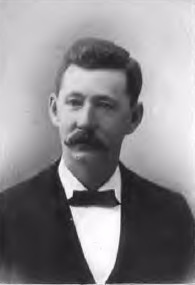 LAYLANDER, Orange Judd, of Cedar
Falls, editor of the Western Teacher, and for the past
ten years city superintendent of the public schools of
Cedar Falls, is one of the leading educators of Iowa,
and is a man who possesses rare executive ability and a
wonderful capacity for work. He is a son of Andrew
Laylander, a farmer of Holmes county, Ohio, who, in
addition to his other duties, taught school during the
winter for thirty years. His mother, whose maiden name
was Amanda Wells, was also one of the first teachers in
Holmes county, beginning her work there in the early
40's, before the free schools were established. LAYLANDER, Orange Judd, of Cedar
Falls, editor of the Western Teacher, and for the past
ten years city superintendent of the public schools of
Cedar Falls, is one of the leading educators of Iowa,
and is a man who possesses rare executive ability and a
wonderful capacity for work. He is a son of Andrew
Laylander, a farmer of Holmes county, Ohio, who, in
addition to his other duties, taught school during the
winter for thirty years. His mother, whose maiden name
was Amanda Wells, was also one of the first teachers in
Holmes county, beginning her work there in the early
40's, before the free schools were established.
Superintendent Laylander was born March 11, 1858,
in Holmes county, Ohio. His early
education was obtained at the district school, this
being supplemented by a systematic course at home under
the direction of his father, covering the ordinary
academic course. Speaking of this work, Mr. Laylander
says: "This individual drill was worth more to me than
all my subsequent training." I had my choice
between studying algebra, physics and German at night
for two hours, or husking corn by lantern light in the
barn.
Whatever of studious habits I gained I attribute
to this discipline, aided by a district school that
taught some things well I possess no college degree, not
even an honorary one, and never try to conceal the fact.
I believe that one's worth or worthlessness must be
measured in deeds, not degrees." Notwithstanding this
opinion, he has done a good deal of college work, for he
took the teachers course in a normal school at Medina,
Ohio, and for two years studied social science in the
post-graduate department of Wooster university. He
thoroughly believes that the best mental growth comes by
diligent effort, and that one must never cease to be a
student.
Mr. Laylander first came to Iowa in 1876,
settling in Poweshiek county, where he had purchased a
farm. After working the farm one season he returned to
Ohio to resume his studies in the normal school. He came
back to Iowa in 1878, rented his farm and accepted a
position as principal of the Malcom schools. Here he
remained for three years, when he became superintendent
of the Brooklyn schools, which position he held for six
years. In 1887 he came to Cedar Palls, where he still
remains as superintendent of the public schools. Superintendent
Laylander is widely known, not only as a teacher, but
through his publications, for besides editing the Iowa
Western Teacher, he has published several text-books,
among them a work in orthoepy and one in geography. He
also does a great deal of work as an institute conductor
and lecturer and has been elected to various important
offices in the State Teachers'
association.
He was brought up to have faith in the principles
of the republican party, but became a democrat through
his belief in free trade. He is a strong
anti-monopolist. He was married on July 20, 1880, to
Miss Anna Milligan, of Shreve, Ohio. They have no
children.
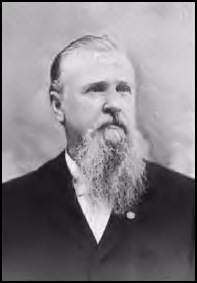 MAGEE, Rev. John Calvin., A. M., D. D., is a
prominent member of the Upper Iowa conference of the
Methodist Episcopal church, and has served as pastor of
some of the strong churches of that body. For six years
he was presiding elder, an office which he now holds,
residing in Cedar Falls. He was delegate from the Upper
Iowa annual conference to the quadrennial general
conference, the lawmaking body of the denomination,
which met in Omaha in 1892, being first in the order of
election on the delegation. Dr. Magee is the
son of David F. and Abigail Rankin Magee. His father
served in the union army as first lieutenant, Company D,
Ninth Iowa infantry. His ancestors on both sides of the
house were Scotch-Irish. His great-grandfather was a
soldier for the colonies in the revolutionary war. His grandfather was a
prominent citizen of western Pennsylvania, and lived to
the age of 101 years. MAGEE, Rev. John Calvin., A. M., D. D., is a
prominent member of the Upper Iowa conference of the
Methodist Episcopal church, and has served as pastor of
some of the strong churches of that body. For six years
he was presiding elder, an office which he now holds,
residing in Cedar Falls. He was delegate from the Upper
Iowa annual conference to the quadrennial general
conference, the lawmaking body of the denomination,
which met in Omaha in 1892, being first in the order of
election on the delegation. Dr. Magee is the
son of David F. and Abigail Rankin Magee. His father
served in the union army as first lieutenant, Company D,
Ninth Iowa infantry. His ancestors on both sides of the
house were Scotch-Irish. His great-grandfather was a
soldier for the colonies in the revolutionary war. His grandfather was a
prominent citizen of western Pennsylvania, and lived to
the age of 101 years.
Dr. Magee was born in Stover's Place, Center
county, Penn., October 31,1845, and was the oldest of
eleven children. His parents came to Iowa in 1855, and
his boyhood was spent on the farm in that pioneer time.
In the debating schools of that period he developed a
talent that served him well in later days. Many times
during the exciting early days of the war his boyish
voice was heard in patriotic appeals in the war
meetings.
Upon the father's return from the war, the boy,
having reached a lawful military age, enlisted and in
less than one month, after laying down the ferule of a
country school teacher, was standing musket in hand on
picket guard in Alabama. He served from its veteran
organization in the Ninth Iowa infantry, which had at
Pea Ridge won the sobriquet of the "Iowa Grey Hounds."
He was with the regiment on Sherman's famous Atlanta
campaign, and in pursuit of Hood, the march to the sea,
through the Carolinas, and on the homeward march, and on
the final grand review at Washington, D. C. He returned
to the state with the regiment at "muster out." During
his service he was promoted to the rank of a non
commissioned officer. He joined the G. A. R. in its
early history; has served several years as a post
chaplain, and was the commander of J. W. McKenzie Post
No. 81 in Hampton in 1898. He served as department
chaplain of Iowa, G. A. R. in 1890 and
1891.
In a very short time after his return from the
war he entered the collegiate institute at Hopkinton, in
which he had previously been a student. Later he entered
Upper Iowa university at Fayette, from which he was
graduated and received the degree, master of arts. For
sometime he was a student of theology at Garrett
Biblical institute in Evanston, 111. In 1870 he was
admitted to the ministerial ranks of the Upper Iowa
conference and since that time he has served
continuously in his chosen calling. In addition to his
ministerial work Dr. Magee has interested himself in
educational matters and has served for several years as
alumni trustee of his alma mater. Occasional articles
from his pen appear in the periodicals of his church,
and a few years since the Methodist Episcopal book
concern published as one of its general catalogue
publications a book entitled "Apostolic Organism," being
a discussion from the standpoint of reason, history and
scripture of the principles of church government, of
which book he is the author. In 1889 Lenox college, a
Presbyterian institution in Hopkinton, where he had been
a student, conferred upon him the honorary degree of
doctor of divinity. Dr. Magee is a type
of many progressive men of Iowa, developed by its
advancing civilization. He was married in June, 1870, to
Miss Jennie A. Cole, of Fayette, an estimable woman of
education and refinement. Nine children have
been born to them, six of whom are living, one son, Carl
C., being the superintendent of city schools in Carroll,
Iowa. Dr. Magee delights to call Iowa by that sweetest
of names-home.
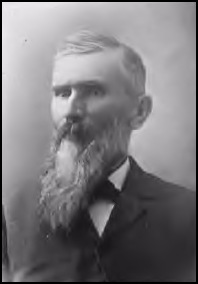 MARKLEY, Henry H., ex-postmaster of Cedar
Falls, was born in Knox county, Ohio, January 7, 1841.
His father, James Markley, was one of the pioneers of
Ohio. Born
in Bedford, Pa., in 1802, he came with his parents to
Knox county, Ohio, in 1807, and in 1866 to Cedar Falls,
where he died in 1871. His father was Henry Markley. and
when he came to Ohio he bought 1,000 acres of timber
land and opened up a farm, where he built and operated a
distillery. He died in 1832. His wife was Jane Morrison.
Jas. Markley's wife was Catherine Ankeny, to whom he was
married in Knox county, Ohio, in 1838. She died March
20, 1899, in Cedar Falls, at the age of 81 years. MARKLEY, Henry H., ex-postmaster of Cedar
Falls, was born in Knox county, Ohio, January 7, 1841.
His father, James Markley, was one of the pioneers of
Ohio. Born
in Bedford, Pa., in 1802, he came with his parents to
Knox county, Ohio, in 1807, and in 1866 to Cedar Falls,
where he died in 1871. His father was Henry Markley. and
when he came to Ohio he bought 1,000 acres of timber
land and opened up a farm, where he built and operated a
distillery. He died in 1832. His wife was Jane Morrison.
Jas. Markley's wife was Catherine Ankeny, to whom he was
married in Knox county, Ohio, in 1838. She died March
20, 1899, in Cedar Falls, at the age of 81 years.
Henry H. Markley went to school in the log
schoolhouse in Ohio and afterward attended the Union
Graded school in Frederick town, and one term in Antioch
college. In September, 1861, he entered the law
department of the University of Michigan at Ann Arbor,
graduating in March, 1863. He was elected and
commissioned captain of Company B, Second Regiment Ohio
militia, in Knox county, July 4, 1863, and was promoted
to lieutenant-colonel of the same regiment September 7,
1863. In October he assisted in raising a company of
volunteers for an Ohio regiment, but on account of
political influence he did not receive the commission
which had been promised him. He then went to California,
and April 28, 1864, he enlisted in Company I, Second
California Veteran volunteers, of San Francisco. He
served as clerk at General Mason's office in San
Francisco for a month, then as clerk to the assistant
commissioner of musters of the Northern district of
California, with headquarters at Fort Humboldt, for
three months, then as company clerk, and finally as
commissary sergeant of the regiment, until he was
discharged at Fort Yuma, Cal., March 31, 1866. A company
had been organized and plans made at this time for
laying an overland telegraph line through Siberia and
Alaska, and Mr.
Markley engaged to assist in the construction of
this line. Just as the party was about to start news was
received of the successful construction of the Atlantic
cable, which rendered the overland telegraph line
useless. Mr. Markley then went to British Columbia and
engaged in mining and prospecting. He settled in Walla
Walla in 1868 but came to Iowa the next year, arriving
in Cedar Falls December 31, 1869.
The next year he went to New York, where he was
married, October 11, 1870, in Fulton, to Mary A.
Schenck. In March, 1871, they moved to a farm in Butler
county, near Parkersburg, where they lived until 1880,
when they moved to Cedar Falls and have lived there
since. In 1876 Mr. Markley built the first modern
creamery and cheese factory in Butler county, and later,
in partnership with Thomas Dadswell, erected and
operated eight creameries in Butler, Grundy and Hardin
counties.
This partnership ended in 1893. Since 1884 Mr.
Markley has been interested in mining in northern Idaho,
and has spent part of his time there.
In February, 1895, President Cleveland appointed
Mr. Markley postmaster of Cedar Falls. His term expired
March 1, 1899. This recognition was earned by his
activity and prominence as a democrat, and by his high
standing as a business man in the community. He has
always affiliated with the democratic party and was
elected mayor of Cedar Falls in 1884. He is serving his
ninth year as member of the school board and fourth year
as president of the board. Mr. Markley belongs to James
Brownell Post No. 222, G. A. R., of Cedar
Falls, and also to the Iowa Legion of Honor. Mr. and
Mrs. Markley have one son living: Fred A., born August
4, 1877. One daughter died in infancy, and another
daughter, Kitty S., died May 1, 1897, aged 25
years.
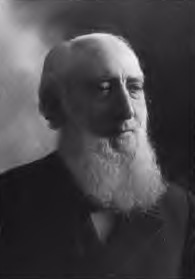 MELENDY, Peter, of Cedar Falls, has been for
more than a third of a century one of the most widely
known of the public men of Iowa. MELENDY, Peter, of Cedar Falls, has been for
more than a third of a century one of the most widely
known of the public men of Iowa.
His father was James Melendy, who was a native of
Amherst, N. H., where he was born October 15, 1791. He
was a breeder of fine stock and a manufacturer of
fanning mills. He was a whig in politics, but with
strong anti-slavery views, and was active in working for
the abolition of slavery. He served his
country as a gallant soldier in the war with Great
Britain, in 1812; was long an elder in the Presbyterian
church. In 1822 he married Miss Susan Smith, who was a
native of Delaware, and with her parents moved to
Cincinnati, Ohio, in the fall of 1818. Her father was
Rev. John Smith, a Baptist clergyman. The first
ancestors of the Melendy family, of which any record
exists, was a Spaniard, Pedro Melendze, who was
appointed governor of a colony in, Florida, in 1565.
After a life's vicissitudes too lengthy for narration
here, he finally found a home in Scotland, and from him
the Melendys have descended. William and Mrs. Standish Melendy
fled from Scotland, in 1675, on account of religious
persecution and, settling in Massachusetts, became the
founders of the Melendy family in America. Thomas, the
grandfather, and William, the great-grandfather of Peter
Melendy, served as soldiers in the war of the
revolution.
His father, James Melendy, moved to Cincinnati,
Ohio, in 1814, where he married Miss Susan Smith in
1822.
Their son Peter was born February 9, 1823, and
when 5 years of age accompanied his father to the old
homestead at Amherst, N.H., and went to school one year
in the same schoolhouse where his father had attended
when a boy. Upon his return home he attended private
schools and academies until 1837, when he entered
Woodward college, where he remained about three years.
In 1840 he went into his father's factory and learned to
manufacture fanning mills, and assisted in carrying on
his father's farms, where breeding of fine stock was a
business.' October 20, 1846, he married Miss Martha F.
Coddington, daughter of Hon. William
Coddington, of Cincinnati, Ohio. Three years later he
purchased a farm near Cincinnati, and moved onto it, and
in 1855 he had so improved it that it took the prize
offered for the best managed farm in the state. In 1855
he helped to organize the Iowa Fine Stock Breeding
company, with a large capital. The company entered
10,000 acres of land in Butler county, Iowa, near Bear
Grove. In 1856 Mr. Melendy came to Cedar Falls, Iowa,
and purchased 1,080 acres of choice land in the same
county, and placed upon it some of his best fine stock
from his Ohio farm. In 1857 he moved onto the farm. But
being remote from good schools, church and society, a
year later he moved, with his family, back to Cedar
Falls for a permanent home. In 1859 Mr. Melendy and W.
M. McCoy took a contract to construct the roadbed for a
railroad from Cedar Falls to Waverly, Iowa; they
expended a large amount of money in the work, but by the
failure of the company before the road was completed
they lost heavily. In 1860 in company with A. D. Barnum,
Mr. Melendy helped establish the first implement, grain
and produce warehouse in the Cedar valley, which grew
into a large business.
In 1862 Mr. Melendy was appointed by Governor
Kirkwood, commissioner for the state, to select 240,000
acres of land, lately granted by congress to Iowa, for
the endowment of the State Agricultural college. There
were at that time nearly 6,000,000 acres of government
land in the limits of Iowa, from which to select, and,
after careful investigation, with excellent judgment,
Mr. Melendy made the selections which have brought to
the State college an ample income. In 1863 and 1864 Mr.
Melendy was also, by appointment of Governor Kirkwood,
made the agent of Iowa at Washington for proving up the
swamp lands of the various counties. In 1864 he was
chosen secretary and superintendent of the State
Agricultural college. He was appointed by President
Lincoln, in 1865, United States marshal for Iowa. When
President Johnson abandoned the party that elected him,
and sought to build up a new personal party, he removed
Mr. Melendy and nearly all of the Iowa federal officials
who refused to ally themselves with the Johnson party.
Mr.
Melendv was one of the projectors and early
officers of the Iowa Central Railroad company. In 1871
President Grant reappointed Mr. Melendy to his old
position of United States marshal, from which he had
been removed by Andrew Johnson, in 1865, which position
he held for four years, performing its responsible
duties with fidelity and ability. After the
breaking out of the rebellion, Mr. Melendy was very
active in raising troops to defend the union. In
September, 1861, he was commissioned by Governor
Kirkwood, to enlist volunteers for the Thirteenth Iowa
Infantry. He procured nearly men enough to make two
companies for that regiment. He served for some time as
quarter-master for the troops stationed at Cedar Falls,
from time to time, as the war progressed, and assisted
in organizing the militia of Black Hawk county by
direction of Adjutant-General Baker. Gov. S. J. Kirkwood, in a
letter to him under date of December 10, 1890, said
this: "I take great pleasure in saying that Mr. Peter
Melendy, in war times, rendered me and our state very
valuable service in raising, organizing and placing in
the field many of our soldiers, in whom we all took such
pride, and in caring for their welfare when within his
reach, in doing the work to which he was assigned."
In 1865 he was instrumental in securing the
location of the Soldiers' Orphans' home at Cedar Falls,
of which he was a member of the board of trustees. He was one of
ten citizens of that town to purchase forty acres of
land upon which the home was located, and which is now
occupied by the State Normal school. In 1864 Mr. Melendy
was one of the delegates from Iowa to the national
republican convention which re-nominated Abraham Lincoln
for president, and was one of the committee sent to
Washington to notify the president of the action of the
convention. That was a mission of which Mr. Melendy has
always felt proud. He was in Washington and witnessed
the second inauguration of the great president who was
so soon to fill a martyr's grave. In 1867 Mr. Melendy
was named among the men from whom the next governor of
Iowa, was likely to be chosen, but he declined to be a
candidate. He was chairman of the republican state
central committee, and under his direction of the
campaign, Iowa gave an overwhelming majority for General
Grant for president in 1868. He was a delegate at large
from Iowa to the Chicago national convention which had
placed Grant and Colfax in nomination that year.
Mr. Melendy was for many years a director of the
State Agricultural society, and served as
vice-president, treasurer and marshal, and was for five
years its president, serving a longer period than any
president before or since. He was a member of the board
of trustees of the Iowa Agricultural college for
fourteen years, doing Invaluable service in organizing
and building up that great State college. He was, in
1866, appointed to serve with the president of the board
of trustees, Lieut. Gov. B. F. Gue,
to visit other industrial colleges of the country,
formulate and report a plan for the organization of our
college, and finally to select suit-able persons to
constitute the faculty. They served three years on this
important mission, and their action met the unanimous
approval of the trustees, both in the plan of
organization proposed, and the choice of Hon. A. S.
Welch, for president, and of other members of the
faculty.
Mr. Melendy has taken a deep interest in
horticulture, and was for many years a member of the
State Horticultural society. He has served many years as
agricultural editor of the Cedar Falls papers, and was
for a long time a regular writer for the Ohio Farmer. He
became associated, in 1873, with A. D. Barnum and D. C.
Overman, in railroad building. They constructed the
Burlington, Cedar Rapids a Northern railway from
Waterloo to Cedar Falls, and also built a large elevator
at Cedar Falls. In 1877 Mr. Melendy was associated with
parties in building fifteen miles of railroad on a line
from Chicago towards Muscatine. In 1879 he received the
appointment of agent for the quartermaster's department
of the United States, for the adjudication of claims
arising out of the war. His field was in
Tennessee, where he served until 1886. It would take a
volume to record the important work done by Mr. Melendy
during his more than forty years of busy life in Iowa.
Endowed with good health, unbounded energy, fine
ability, and broad liberality, he has for almost half a
century been one of the conspicuous public men of the
state. In all his varied occupations and public
positions he has won warm and abiding friends, and the
sincere respect of the people who know him
best.
His first wife died at Cedar Falls, August 6,
1867, at the age of 38, leaving two children, Charles
B., born May 15, 1848, and Luetta Isabella, born January
19, 1852. In 1868, Mr. Melendy married Mrs. Mary A.
McFarland, daughter of ex-Senator T. W. Woolson, at Mt
Pleasant. She is a sister of Judge John S. Woolson, of
the United States district court.
Mr. Melendy has been an active and prominent
member of the Presbyterian church all of his mature
life. Now in the evening of a long, busy and useful
career, his old neighbors keep him in the mayor's office
of the city he has served so well, in various ways, for
almost half a century.
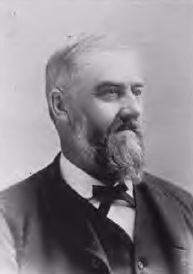 PLACE, Thomas Wheelock, holds the responsible
position of master mechanic of the Iowa division of the
Illinois Central railway, formerly known as the Dubuque
& Sioux City railroad. He has been with this company
since 1856, and in his present capacity since 1861, a
testimonial to his worth which few men can improve
upon.
Railways do not keep men long at the head of a
department unless they are of extraordinary value, and
Mr. Place is so regarded by the great corporation he
serves so well. PLACE, Thomas Wheelock, holds the responsible
position of master mechanic of the Iowa division of the
Illinois Central railway, formerly known as the Dubuque
& Sioux City railroad. He has been with this company
since 1856, and in his present capacity since 1861, a
testimonial to his worth which few men can improve
upon.
Railways do not keep men long at the head of a
department unless they are of extraordinary value, and
Mr. Place is so regarded by the great corporation he
serves so well.
He was born at Ackworth, Sullivan county, N. H.,
January 2, 1833. His father, Ebenezer Place, was a
native of New Hampshire, where he was born November 14,
1800. He died there at the age of 36. The mother, whose
maiden name was Polly Dickey, was born in 1803, at
Ackworth, N. H., and died in 1874, while residing with
this subject at Waterloo. The life of
Thomas W. Place, until he reached his 17th year, was
spent on the farm, where he attended district school in
the winter, and, as is customary with farmers' boys,
helped with the crops in summer.
In March, 1850, he entered the employ of Park
& Woolson, manufacturers of machinery for finishing
woolen goods, as machinist apprentice. In 1852 he went
to Boston and secured employment as machinist in the
Boston locomotive works, and during the following year
was engaged in firing a locomotive on the Northern
railroad of New Hampshire, now a part of the Boston
& Maihe system. In January, 1854, he removed to
Chicago and entered the service of the Chicago &
Aurora railway (now a part of the Chicago, Burlington
& Quincy) as machinist The following April he went
to the Illinois Central, where he ran a locomotive until
November, 1856, at which time he resigned to accept a
similar position with the Dubuque & Sioux City line,
then under construction from Dubuque to Dyersville. He
held the throttle on the locomotive which drew the first
passenger train from Dubuque to Dyersville on the
occasion or the opening of that line for business, May
11, 1857. He continued in the employ of the company as
engineer until August, 1859, when he was appointed
foreman of the repair shops with headquarters at
Dubuque. In May, 1860, he was tendered the foremanship
of engine repairs by the Chicago & Alton, which he
accepted, and removed to Joliet, 111., to assume the
duties of the position. In 1861 he returned to the
Dubuque & Sioux City, as master mechanic, and
remained in Dubuque until the shops were removed to
Waterloo in 1870. That line had, in the meantime, been
extended to Sioux City and merged into the Illinois
Central system, of which it is still a part. At present
he is master mechanic of the Dubuque and Cherokee
divisions-the Iowa lines.
In politics Mr. Place is a republican, and as
such was elected a member of the city council of
Waterloo almost consecutively for the years 1872 to
1880; also a member of the east Waterloo school board
1876 to 1885. He is a member of A. P. & A. M.,
Dubuque; Halcyon Encampment No. 1, and Harmony Lodge No.
2, I. O. O. F., having filled all the chairs in the last
two lodges.
Mr. Place was married, July 24, 1860, to Mary
Josephine Myers, daughter of William and Susan Shannon
Myers, one of Dubuque's oldest and most respected
families. They were both natives of Missouri, who came
to Dubuque county at a very early day. Mr. Myers died in
Dubuque in 1884, and Mrs. Myers in Waterloo, at the
residence of her daughter, Mrs. Place, in 1890. The
marriage of Mr. Place and Miss Myers took place when the
family were living in Julien, Dubuque county. They are the
parents of four sons, now grown to manhood and holding
positions of responsibility and trust. They are,
Augustus Mason, James Williams, Frederick Ebenezer, and
Dorrance Myers.
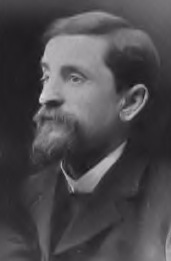 SNYDER, Edward Allen, of Cedar Falls,
postmaster of Cedar Falls and editor of the Cedar Falls
Semi-Weekly Gazette, is a landmark in the history of
Iowa newspaper. The high moral tone and progressive
spirit of this paper, which has been under his direction
for more than a quarter of a century, speak volumes for
his worth as an editor and citizen. Its beneficial
impress is universally acknowledged, not only at Cedar
Falls, but throughout all that section of the state. As
a man of true principles in every relation of life, as a
brave soldier of long and honorable record, as a citizen
who could be counted upon for more than his part of
every good work, as an editor of ability and pure
record, as a Christian man, true to his profession, his
life is a record of noble deeds and purity, of moral
character truly worthy of
emulation. SNYDER, Edward Allen, of Cedar Falls,
postmaster of Cedar Falls and editor of the Cedar Falls
Semi-Weekly Gazette, is a landmark in the history of
Iowa newspaper. The high moral tone and progressive
spirit of this paper, which has been under his direction
for more than a quarter of a century, speak volumes for
his worth as an editor and citizen. Its beneficial
impress is universally acknowledged, not only at Cedar
Falls, but throughout all that section of the state. As
a man of true principles in every relation of life, as a
brave soldier of long and honorable record, as a citizen
who could be counted upon for more than his part of
every good work, as an editor of ability and pure
record, as a Christian man, true to his profession, his
life is a record of noble deeds and purity, of moral
character truly worthy of
emulation.
He was born at Cambria, Pa., September 7,
1838. At
the age of 16 he was valedictorian at New Columbus
academy. He attended Wyoming seminary at Kingston. Pa.;
Dickenson seminary at Williamsport, and Dixon college at
Dixon. III. Ho was proficient in his studios, always
standing well in his classes. During the years of his
school work, he spent two years as an apprentice in the
printing business, a part of the time doing the
foreman's work on the Williamsport Independent He came
west to Dixon, 111., in 1858; taught and attended school
for two years, then returned to Pennsylvania, spending
the winter of 1860-1 as principal of one of the schools
at Hollidaysburg. He delivered an address while there
upon " Success in Life" before a large audience, which
received much commendation.
He was an enthusiastic supporter of the war, and
the following July, at his old home, made an address in
advocacy of that belief. He returned to his late home,
Dixon, and enlisted in September, 1861: became poet
adjutant of the Dement Phalanx until January, 1862, when
they were ordered to Springfield, consolidated with a
Freeport regiment under Col. John A. Davis the
Forty-sixth Illinois volunteers, and took part in the
siege of Ft. Donelson, where great exposure was endured.
He was in both days' fighting at Shiloh; took part in
the siege of Corinth and battle of Hatchee river; was
subsequently commissioned from a private over the
non-commissioned officers of the company as second
lieutenant, the commission having conspicuously upon it
these words: " Promoted for meritorious service at Ft.
Donelson and Shiloh." He was later detailed for service
as an officer of the United States signal corps, and at
Vicksburg sect the first messages Generals Grant and
Sherman made use of in the west, by opening
communication late during the first night of the
investment, for General Sherman, with Admiral Porter's
fleet seven miles up the Mississippi river. He served in
Mississippi and Tennessee and was mustered out at
Nashville in the winter of 1864-5. He has been commander
of the G. A. R. post at Cedar Falls and a delegate to
the national G. A. R. encampment.
He first commenced business after the war as a
surveyor at Dixon, but shortly removed to Clinton. Iowa, where he
made a profitable trade of a tract of timber land
purchased by him, located in Wiscon-sin, and in the
spring of 1866 erected a store building and stocked it
with groceries, under the firm name of Snyder Brothers
& Santee. In the early part of 1867 he moved to
Cedar Falls, where he has since resided. He and his
brother, C. W. Snyder, purchased the Cedar Falls Gazette
in 1868. He was associate editor until 1869, since which
time he has been editor. He was elected county surveyor
in 1870, and held that position for four years. For the
past eighteen years he has devoted his entire time to
the editorial work of the paper, and it has become one
of the substantial newspapers of the state. It is now
published as a semi-weekly. He has been a republican
ever since the birth of the party; was in the Chicago
convention at the time Lincoln was nominated; cast his
first ballot for him, and has voted for every republican
president since that time. In 1899 he was appointed by
President McKinley to be postmaster of Cedar Falls. He
has been an earnest temperance worker; conducted, in a
large measure, the prohibitory amendment campaign in
Black Hawk county In 1882, and made many addressee. In
later years was untiring in the enforcement of the law.
The freedom of Cedar Falls from the iniquitous saloon
and the enviable reputation of that city as to morals is
admitted as being largely due to his fearless
prosecution and earnest work with law and
pen.
He has been active in church and Sabbath school
work for forty years; a teacher and class leader for
over thirty years. In 1887 was elected as a lay
delegate, with Hon. J. P. Farley, of
Dubuque, as his colleague, by the Upper Iowa conference,
M. E.
church, to the general conference which sat in
New York during May, 1888, and served on important
committees. He is a member of several fraternal orders;
a Master Mason and Knight Templar. He was married
September 25, 1867, at Cedar Falls to Miss Mary A.
Cameron.
Two children have been born to them, the oldest
dying at the age of 7 years. The younger is married, and
a sweet grand-child gladdens the home of the parents and
grandparents. They have a fine residence on the most
sightly spot in that beautiful city of Cedar Falls, and
there Mr. and Mrs.
Snyder faithfully ministered to the comfort of
her parents, one of whom was helpless from paralysis for
more than eleven years. Since their death,
the same dutiful care is being given to the venerable
father, aged 90 years, of this subject, and
step-mother.
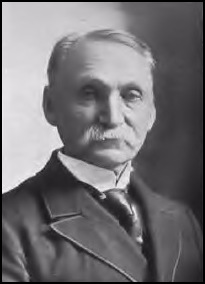 TOWNSEND, Edward, of Cedar Falls, one of the
trustees of the State Normal school, is among the oldest
settlers in Black Hawk county, having lived there since
1859. His parents were Elijah Townsend, who began life
poor, but through hard work and good management as a
farmer acquired a comfortable fortune, and Rosannah
Downing Townsend. Both were English Quakers. The father
died in 1860, aged 72 years, and the mother in 1866,
aged 72 years. TOWNSEND, Edward, of Cedar Falls, one of the
trustees of the State Normal school, is among the oldest
settlers in Black Hawk county, having lived there since
1859. His parents were Elijah Townsend, who began life
poor, but through hard work and good management as a
farmer acquired a comfortable fortune, and Rosannah
Downing Townsend. Both were English Quakers. The father
died in 1860, aged 72 years, and the mother in 1866,
aged 72 years.
Edward Townsend was born November 28, 1831, in
the town of La Grange, in Duchess county, N. Y. He was
brought up on a farm and secured his early education at
the district school. He afterwards attended Berkshire
academy, Mass., for one year. Circumstances did not
permit him to pursue his education any further. In May 1859, he
came to Iowa and settled first at Waterloo. Here he
remained for two years, removing in 1861 to Cedar
Falls. For
a year he was engaged in the banking business, and on
August 8, 1862, he enlisted as a private in Company B,
of the Thirty-first Iowa infantry. He was elected second
lieutenant, by his company, and was soon afterwards
promoted to the rank of first lieutenant. He was in the
battles of Chickasaw Bayou, Arkansas Post and several
other skirmishes, and in June, 1863, he was compelled to
resign his commission on account of disabilities
resulting from sickness contracted while in the service.
Returning home he resumed his business in the bank and
thus continued for eleven years, retiring in 1874. In
1878 he engaged in the lumber and coal business, which
he still continues, also dealing in real estate
loans.
Mr. Townsend has always been a republican and
represented Black Hawk county in the Twenty-second and
Twenty-third General Assemblies. He has also held
several local and county offices, including membership
in the city council, school board and the board of
supervisors.
He was mayor of his city in 1870-71 and served as
a member of the board of commissioners for the erection
of the State Soldiers' and Sailors' monument, and has
been trustee of the State Normal school since 1894.
He was married October 17, 1867, to Sarah A.
Seward, who died March 20, 1872, leaving three children,
two of whom are living, Katherine S., born in 1868, and
Mary L., born in 1870. Mr. Townsend's second wife was Sarah Huntington, of
Oswego county, N. Y., whom he married September 26,
1878. They have one child, Edward H., born May 5,
1881.
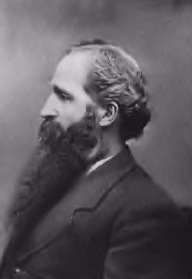 WHITAKER, Romaine Adrian, treasurer of the
Cutler Hardware company, of Waterloo, has been in active
business in Iowa since 1853, now about forty-five years,
and still continues, though nearly 70 years old. He is a
genuine Yankee, the ancestors of both his parents having
been among the earliest settlers of the New England
colonies. His father's ancestors settled at Haverhill,
Mass., prior to 1650. William Whitaker, his great
grandfather, rendered valuable services to the colonies
during the French and Indian wars, and fought in the
revolution. Clemence, the son of William, and
grandfather of Romaine, was one of the early settlers of
Oneida county, N. Y., where he cleared up a farm in the
comparative wilderness of that country in 1801. He was married
to Alice Hall, and their oldest son, Jerome, was born
May 25, 1806, in South Trenton, Oneida county, N.
Y. He was
married August 27, 1827, to Lydia N. Demming, who was
born October 19, 1807, at Holland Patent, N. Y. Their
oldest son was Romaine A., the subject of this sketch.
Jerome Whitaker died at Waterloo, Iowa, December 25,
1886, and his wife at Carthage, N. Y., November 12,
1875. WHITAKER, Romaine Adrian, treasurer of the
Cutler Hardware company, of Waterloo, has been in active
business in Iowa since 1853, now about forty-five years,
and still continues, though nearly 70 years old. He is a
genuine Yankee, the ancestors of both his parents having
been among the earliest settlers of the New England
colonies. His father's ancestors settled at Haverhill,
Mass., prior to 1650. William Whitaker, his great
grandfather, rendered valuable services to the colonies
during the French and Indian wars, and fought in the
revolution. Clemence, the son of William, and
grandfather of Romaine, was one of the early settlers of
Oneida county, N. Y., where he cleared up a farm in the
comparative wilderness of that country in 1801. He was married
to Alice Hall, and their oldest son, Jerome, was born
May 25, 1806, in South Trenton, Oneida county, N.
Y. He was
married August 27, 1827, to Lydia N. Demming, who was
born October 19, 1807, at Holland Patent, N. Y. Their
oldest son was Romaine A., the subject of this sketch.
Jerome Whitaker died at Waterloo, Iowa, December 25,
1886, and his wife at Carthage, N. Y., November 12,
1875.
R. A. Whitaker was born August 26, 1828, at
Holland Patent, N. Y. He lived on a farm until he was of
age, receiving his education at the district school and
at Lowville academy.. He taught school a few years, and
in 1853 came to Iowa, locating at Waterloo in 1856,
purchasing an interest in a sawmill, which he operated
for two years. He began work January 1, 1860, as a clerk
in the office of the county treasurer and recorder, and
in 1867 was elected to the office of treasurer of Black
Hawk county, and held the position for eight years. He
formed a partnership in 1876 under the firm name of
Whitaker & Edgington, dealers in agricultural
implements, which he continued for two years. In
February, 1878, he was elected grand recorder of the
Ancient Order of United Workmen, and held the place for
fifteen years, resigning in 1893 to become one of the
Cutler Hardware company, and is still a member of this
firm, serving as its treasurer.
Prior to the civil war Mr. Whitaker was
democratic in politics, but for the last thirty - five
years has been an ardent republican. Besides the
offices already mentioned, he was first mayor of
Waterloo, holding the office five consecutive terms. He
was also a member of the school board for eighteen
years, serving as its president for several years. He
was secretary of the Black Hawk County Agricultural
society for twenty-one years. He is a member of the
Masonic fraternity, and has served as presiding officer
in the lodges at Waterloo for a number of years, and as
one of the grand officers of the Grand Royal Arch
Chapter of Iowa. He was a member of the board of
custodians of the grand chapter for ten years. He is a
member of the Episcopal church.
Mr. Whitaker was married September 17, 1856, at
Great Bend, N. Y., to Mary E. Clark, who was
born at Evans Mills, N. Y., April 17, 1832, and died at
Waterloo, August 24,1893. They had three children, one
daughter and two sons, but both of the boys died in
infancy. The daughter, Ardelle Genevieve, was born June
29, 1858. She was married to G. A. Goodell, October 12,
1881, and died March 24, 1893, leaving two children, who
live with their father at Cedar
Rapids.
Mr. Whitaker has had much to do with the growth
and prosperity of Waterloo during his long residence
there, and is held in the highest esteem for his
liberality and public spirit, and his generous,
charitable disposition. He is a walking encyclopedia of
the history of Black Hawk county and Waterloo,
possessing a remarkable memory, which has been assisted
by keeping a diary, in which he has made daily records
of passing events ever since the days of his early
youth.
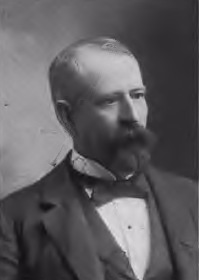 WHITE, Henry Barre, of Waterloo, better known
in newspaper and fraternal circles as H. B. White, was
born in Auburn, Ohio, where his early youth was
spent. His
father's family can be traced back to the Pilgrim
fathers, the present Whites being descendants of
Peregrine White, whose parents were Mayflower
passengers.
On the mother's side he descends from Cotton
Mather, the famous New England preacher, who labored
with great zeal to establish the ascendency of the
church in civil affairs, and to put down witchcraft by
legal sentences. He was a writer of many books-some 382,
not reckoning his illustrations of the sacred
scriptures-among which was Magnalia Christi Americana, a
very quaint and curious book, full of learning and piety
and not without prejudice. He was a
graduate of Harvard, and made D. D. and F. R. S. by the
University of Glasgow. With all his faults, he was a man
of excellence of character, and his great work in the
interests of the poor, for mariners, slaves, criminals
and Indians, was remarkable because philanthropy was far
more rare in those days than at the present
time. WHITE, Henry Barre, of Waterloo, better known
in newspaper and fraternal circles as H. B. White, was
born in Auburn, Ohio, where his early youth was
spent. His
father's family can be traced back to the Pilgrim
fathers, the present Whites being descendants of
Peregrine White, whose parents were Mayflower
passengers.
On the mother's side he descends from Cotton
Mather, the famous New England preacher, who labored
with great zeal to establish the ascendency of the
church in civil affairs, and to put down witchcraft by
legal sentences. He was a writer of many books-some 382,
not reckoning his illustrations of the sacred
scriptures-among which was Magnalia Christi Americana, a
very quaint and curious book, full of learning and piety
and not without prejudice. He was a
graduate of Harvard, and made D. D. and F. R. S. by the
University of Glasgow. With all his faults, he was a man
of excellence of character, and his great work in the
interests of the poor, for mariners, slaves, criminals
and Indians, was remarkable because philanthropy was far
more rare in those days than at the present
time.
H. B. White came to Iowa in 1856 with his
parents, who settled at Garnaville, then the county seat
of Clayton county. At the age of 14 he ran away to
become a soldier, but was overhauled at Benton
Bar-racks, not, however, until he had received a wound
from the premature explosion of a new field piece, which
kept him six weeks in the hospital. His business
training has been a practical one since the day when he
took the first job on his own account - cutting hoop
poles, at the age of 11. Following a course in the
public schools of McGregor, Iowa, and in the Upper Iowa
university at Fayette, he clerked, worked on a farm and
followed the painter's trade for some sixteen years
During all those years, and in the ones that have since
passed, he has devoted himself to study, and is now what
may properly be termed a self-educated and self-made
man. At present he holds the responsible position of
grand recorder of the Ancient Order of United Workmen
for the state of Iowa, and has much to do in the
promotion of the insurance feature of that order. The
plan of assessment in use by that organization, and
which has proved such a meritorious feature, was
formulated by him. He is the editor and manager of the
Iowa Workman, a monthly paper devoted to the interests
of the A. O. U. W. He is also prominent in the Masonic
and Odd Fellows orders. In politics he is a sound money
democrat. He was married in 1873 to Miss Matilda
Luckenbill. They have four children, two girls and two
boys. In religious belief they are Presbyterians.
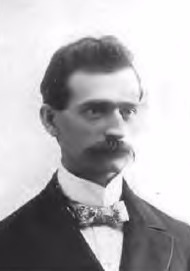 WINNINGER. Joseph Urban, is one of the
leading business men of the city of Waterloo, and has
worked his way up to his present prominent position
entirely by his own efforts, having worked at the trade
of a tailor ever since he was 14 years old. WINNINGER. Joseph Urban, is one of the
leading business men of the city of Waterloo, and has
worked his way up to his present prominent position
entirely by his own efforts, having worked at the trade
of a tailor ever since he was 14 years old.
Both his father, John Winninger, and mother,
Marie, were natives of Alsace. J. U. Winninger
was born May 25, 1863, near Muehlhausen, in the province
of Alsace, France. He attended the
common schools until he was 14 years old, receiving the
thorough discipline and instruction so characteristic of
the educational system of that country. Living so near
the boundary of France, the French and German languages
were both taught in the schools which he attended. At 14
he left school, and was apprenticed to learn the trade
of a tailor. This occupation he has followed ever since.
In the summer of 1882, when he was 19 years old
he came to America, and, after spending two months in
New York city, he came to Waterloo, in October. Upon his
arrival in New York, he had only $6, but, with the
little he earned in that city, and with the help of a
friend in Waterloo who loaned him $15, he was enabled to
reach his destination. He immediately secured work in
Waterloo, and within two weeks he was square with the
world and began to accumulate money for himself. After
about four years spent in strict attention to business,
he was able through thrift and economy to start in
business for himself. He first located at Manchester,
and, after two prosperous years there, went to San Jose,
Cal., where he secured a position as cutter in a large
tailoring establishment. He soon launched out for
himself again, however; this time at Woodland, Cal. For
six years he did a flourishing business, and in
September, 1895, returned to Waterloo and opened a
tailoring establishment of his own. He has increased the
scope of his business from year to year until he now
commands a very wide patronage.
Mr. Winninger has always been a republican in
politics, having voted with that party ever since he
became naturalized. But he has never
had time to take any active part in politics. He is a
member of the Masonic and Knights of Pythias
lodges.
Mr. Winninger was married January
5, 1891, to Louisa Ewald, at Waterloo. They have one
daughter, Gladys, born in 1895, and Mr. Winninger has a
daughter, Marguerite, aged 12, by a former
marriage.
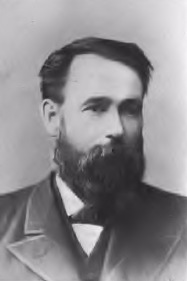 WRIGHT, David Sands, professor of mathematics
in the State Normal school at Cedar Falls, has the honor
of being the first person to conduct a recitation in
that institution, and to his strong personal influence
much of the growth and success of the school are
attributed. He has now been connected with this school
for over twenty years, and has been giving the best
years of his life in furthering the cause of better and
more thorough preparation for teachers, and is a firm
believer in the mission of the Normal school. He was
born December 7, 1847, at New Petersburg, Highland
county, Ohio. His father was Joseph Wright, a prominent
and able minister in the Friends church, and his mother
was Lydia Cowgill. He was educated in the public schools
of Highland county, Ohio, at New Vienna, Ohio, high
school. He
also received private instruction under Dr. McKibben, an
eminent scholar and mathematician at Hillsboro, Ohio;
but on the whole, he has been largely self-educated. He
received the honorary degree of A. M., from Penn
college, Oskaloosa, Iowa, in 1887. WRIGHT, David Sands, professor of mathematics
in the State Normal school at Cedar Falls, has the honor
of being the first person to conduct a recitation in
that institution, and to his strong personal influence
much of the growth and success of the school are
attributed. He has now been connected with this school
for over twenty years, and has been giving the best
years of his life in furthering the cause of better and
more thorough preparation for teachers, and is a firm
believer in the mission of the Normal school. He was
born December 7, 1847, at New Petersburg, Highland
county, Ohio. His father was Joseph Wright, a prominent
and able minister in the Friends church, and his mother
was Lydia Cowgill. He was educated in the public schools
of Highland county, Ohio, at New Vienna, Ohio, high
school. He
also received private instruction under Dr. McKibben, an
eminent scholar and mathematician at Hillsboro, Ohio;
but on the whole, he has been largely self-educated. He
received the honorary degree of A. M., from Penn
college, Oskaloosa, Iowa, in 1887.
Professor Wright began teaching in the county
schools of Highland county, Ohio, in 1866. He came to
Iowa in 1872, locating at the town of Salem, where he
was elected principal of Whittier college. In this
capacity he served four years, and in 1876, when the
State Normal school was opened, he was given the chair
of English language and literature. In 1880 he was
transferred to the chair of mathematics in the same
institution, which position he still holds. The
professor is widely known throughout educational circles
in Iowa, in many capacities. He has conducted teachers'
institutes in all parts of the state, and has been a
lecturer on a great variety of subjects, the one best
known being "The Coming Woman," which he has delivered
many times. For the past twenty-two years he has been an
active member of the State Teachers' association, and
has frequently read papers before that body, and has
served upon numerous important committees in the
association. For three years he was a member of the
executive committee, one year of which he acted as its
chairman. He is now a member of the educational council
of the state association. He is an
extensive contributor to educational magazines.
Prominent among the articles from his pen may be
mentioned the series of papers entitled "The Scroggs
Family," "Frank Davis," "A. Jackson Smyth," and "The Jug
Town Academy." He has also written and published a
number of hand-books for teachers, which have had an
extensive sale. The most important of these are "A
Drill-book in English Grammar," "Teachers' Hand-book of
Arithmetic," "Geometrical Exercises," and "A Geometry
Note Book."
Professor Wright is a member of the Friends
church, and is also a minister in the same. He was
married June 24, 1880, to Miss Eliza Rawstern, of
Greencastle, Jasper county, Iowa. They have four
children,-a son and three
daughters.
The information
on Trails to the Past © Copyright may be used in personal family history research, with source citation. The pages in entirety may not be duplicated for publication in any fashion without the permission of the owner. Commercial use of any material on this site is not permitted. Please respect the wishes of those who have contributed their time and efforts to make this free site possible.~Thank you! |